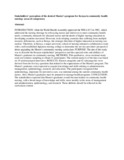Stakeholders' perception of the desired Master's program for Kenya in community health nursing: areas of competency

View/
Date
2008-06Author
Naruse K.
Tashiro J.
Sakyo Y.
Ichikawa W.
Karani A K.
Type
ArticleLanguage
enMetadata
Show full item recordAbstract
INTRODUCTION:
After the World Health Assembly approved the WHA 45.5 in 1992, which addressed the nursing shortage by refocusing nurses and midwives to meet community health needs, community demands for educated nurses and the needs of higher nursing education in developing countries increased. However, in developing countries that suffering from multiple resource deficiencies, such as Kenya, the strategic direction of higher education in nursing was unclear. Therefore, in Kenya, a major university school of nursing initiated a collaborative study with a well-established Japanese nursing college to determine the service-providers' perspective about upgrading the Master's community nursing curriculum.
PURPOSE:
The aim of the study was to describe the Kenyan stakeholders' perspective and the expected roles and abilities of Master's graduates in community nursing.
METHODS:
This qualitative, cross-sectional study used convenience sampling to obtain 21 participants. The content analysis of the data was based on 19 semistructured interviews.
RESULTS:
Sixteen categories and 42 subcategories were derived from the five key questions that related to the expectations of the Master's program. The Master's graduates were expected to acquire knowledge and skills relating to administration, management, epidemiology, research, and education. The participants recognized that epidemiology, important for preventive care, was minimal among the current community health nurses. Also, Master's graduates must be prepared to manage health programs.
CONCLUSION:
The stakeholders expected that Master's graduates would become leaders in community health nursing, with a broad range of knowledge and skills, most notably in the areas of management and administration, epidemiology, and research. Those abilities should be reflected in the curriculum content.
URI
http://www.ncbi.nlm.nih.gov/pubmed/19689769http://erepository.uonbi.ac.ke:8080/xmlui/handle/123456789/18055
Citation
Japan Journal of Nursing Science 2008 Jun;5(1):61-7Publisher
Department of Nursing, University of Nairobi
Collections
- Faculty of Health Sciences (FHS) [10415]
- Theses & Dissertations [241]
